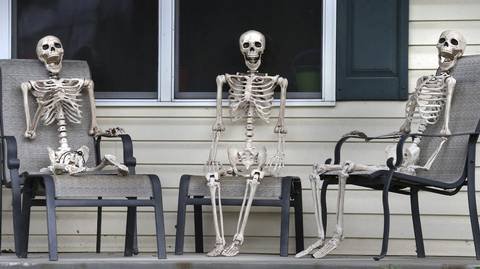What happens after we die?
Modern humans have been around for at least 200,000 years or so, and after all that time, the answer still eludes and terrifies us. We know it’s the end, we know we’ll all face it, but we still don’t know what it feels like, or what happens after.
Now, scientists like Dr. Sam Parnia, director of critical care and resuscitation research at NYU Langone School of Medicine in New York City, are trying to get a little closer to some answers.
Parnia told Live Science one of the things his team is researching is whether your brain remains conscious enough after death that you have time to actually know you’re dead
Most people consider a person dead when their heart stops, Parnia told Live Science. Once the heart is no longer pumping blood throughout the body, cells begin to suffocate and die – including brain cells.
“You lose all your brain stem reflexes – your gag reflex, your pupil reflex, all that is gone,” he told Live Science. Still, sometimes it takes a while for those cells to truly die, and during that time, you might be at least somewhat aware of what’s going on.
Essentially, that means you could actually know that you’ve died after you’ve died.
Parnia told Live Science that his team is looking at large numbers of people who have suffered cardiac arrests to figure out what they’ve gone through when their hearts stopped.
“We’re trying to understand the exact features that people experience when they go through death, because we understand that this is going to reflect the universal experience we’re all going to have when we die,” he said.
Parnia performed a similar study in 2014, The Telegraph reported. His team examined the cases of more than 2,000 cardiac arrest patients and interviewed 140 of them. About 40 percent said they experienced an awareness while their hearts had stopped.
“Conscious awareness appears to have continued for up to three minutes into the period when the heart wasn’t beating, even though the brain typically shuts down within 20-30 seconds after the heart has stopped,” Parnia told the Telegraph.
Patients described hearing noises of machines in the operating room or of having a sense of time speeding up or slowing down.
Some also talked about feeling peaceful or protected, a theme commonly found among those who have reported near-death experiences in which they’ve been clinically dead but then revived, Scientific American reported.
Some attribute this after-death or near-death experience not to a true awareness but to a surge of activity in the brain that comes from a lack of oxygen, called hypoxia. In effect, the argument is that if you “know” you’re dead, then by definition you aren’t dead yet, reported National Geographic.
“These are not return-from-death experiences,” Kevin Nelson, a neurologist at the University of Kentucky, said at a conference, reported National Geographic. “During these experiences the brain is very much alive and very much active.”
Hi! I am a robot. I just upvoted you! I found similar content that readers might be interested in:
https://www.sacbee.com/latest-news/article179920856.html
Downvoting a post can decrease pending rewards and make it less visible. Common reasons:
Submit